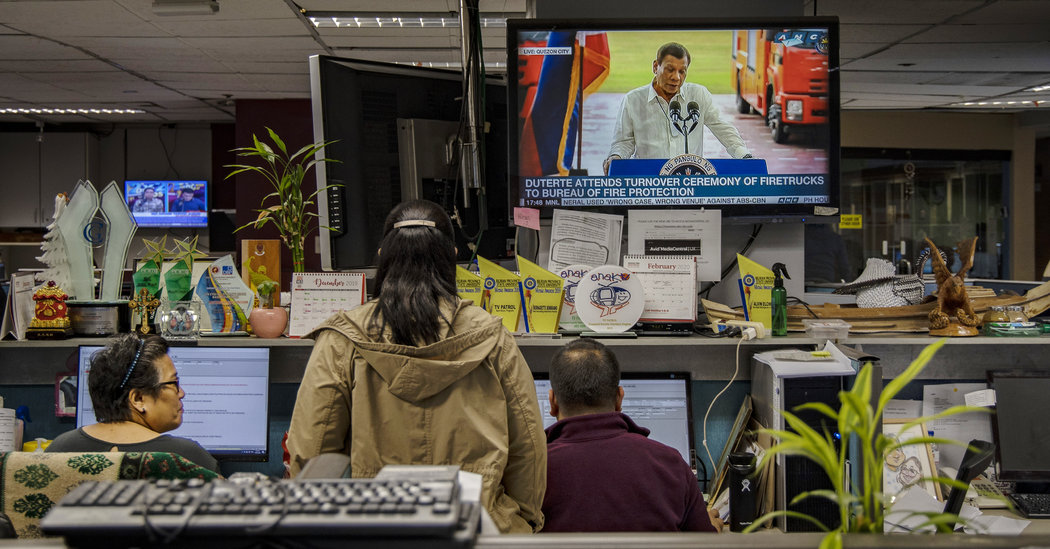MANILA — A leading media network in the Philippines was forced off the air on Tuesday, making it the first major broadcaster to have met such a fate during the administration of President Rodrigo Duterte, which is cracking down on news outlets that have been critical of his leadership.
The government’s telecommunications commission issued ABS-CBN Corp. a cease-and-desist order one day after the media giant’s broadcast franchise, which is granted by Congress, expired.
ABS-CBN said that it would comply with the order. “Millions of Filipinos will lose their source of news and entertainment when ABS-CBN is ordered to go off the air on TV and radio tonight when people need crucial and timely information as the nation deals with the Co-19 pandemic,” the company said.
On Tuesday night, the broadcaster wrapped up its programming on one channel with a message that said: “This is ABS-CBN Corporation Channel 2. In the service of the Filipino. Now signing off.”
ABS-CBN is known for its prime time flagship news program, TV Patrol, as well as soaps and afternoon variety TV shows. Its offerings also include coverage of popular sports such as basketball and boxing.
Critics of Mr. Duterte say he has attacked media outlets that have closely documented his brutal war against drug dealers and users that has left thousands of people dead. ABS-CBN, along with the Filipino online news site Rappler, have been at the forefront of such coverage, which has helped prompt international rebuke.
Mr. Duterte has not tried to hide his scorn for the media, calling reporters “sons of bitches” and accusing them of being spies. As he has with ABS-CBN, Mr. Duterte has personally gone after Rappler, arguing that it was partly owned by foreign investors. That campaign appears to have slowed since Rappler’s investors transferred their shares to their Filipino partners.
Mr. Duterte had earlier warned that he would not allow the renewal of ABS-CBN’s broadcast franchise. The House of Representatives, which is stacked with allies of Mr. Duterte, has sat on several bills supporting the network’s license renewal.
Mr. Duterte’s administration has created a difficult and at times hostile environment for reporters. He has leveled death threats against some reporters and said that none should be “exempted from assassination.”
The move to shut down ABS-CBN’s broadcasts was met with criticism from industry groups and human rights activists who called it an attack on press freedom.
“ABS-CBN’s indefatigable journalists have fully embraced their role to proe the public with vital information on the pandemic despite risks to their health and safety,” the Foreign Correspondents Association of the Philippines said in a statement.
“The move is clearly a case of political harassment against a pillar of Philippine democracy that employs thousands of Filipinos whose livelihoods are now at risk with the order,” the group said.
The National Union of Journalists of the Philippines assailed the move against the network and urged the public to stand together and resist restrictions on media freedoms.
“It sends a clear message: What Duterte wants, Duterte gets,” the organization said. “And it is clear, with this brazen move to shut down ABS-CBN, that he intends to silence the critical media and intimidate everyone else into submission.”
Risa Hontiveros, an opposition senator, said the order to shut down ABS-CBN at a time of crisis was “ill-timed and insensitive to the needs of the public.”
Congressional leaders had asked the telecommunications commission to issue a temporary permit to allow ABS-CBN to operate while the House of Representatives debated renewing the network’s franchise. But the government’s solicitor general, Jose Calida, warned the commission against allowing the network to operate beyond the expiration of its license.
In February, Mr. Calida asked the Supreme Court to revoke the franchise of the network and its subsidiary, ABS-CBN Convergence, accusing it of illegally operating a pay-per-view channel. Mr. Calida has also accused the company of hiding behind what he said was an “elaborately crafted corporate veil” by allowing foreign investors to take part in its ownership.
ABS-CBN has denied the allegations and said its operations were above board.
President Duterte has also accused the network of bias, saying that it did not air his political campaign advertisements during the 2016 presidential elections yet ran a negative advertisement by his opponent.
In a Senate hearing in February, Carlo Katigbak, ABS-CBN’s president and chief executive, offered an apology and said the network ran most of Mr. Duterte’s advertisements. “We are sorry if we offended the president,” he said. “That was not the intention of the network.”
Human Rights Watch decried the government’s move to shut down the network, saying the solicitor general should “stop acting like Duterte’s attack dog.”
“The Filipino people should reject this despotic move to harass and silence a media organization known not only for its reach but also for its competence and dedication to deliver the news,” said Phil Robertson, the rights group’s deputy Asia director.



